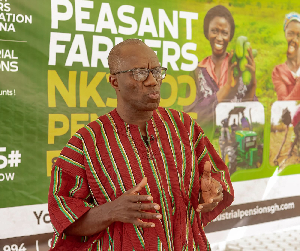Politics of Friday, 10 May 2024
Source: Papa Quasy Abakah, Contributor
'Agric for Wealth' policy is the ultimate game changer for Ghanaian farmers – George Twum-Barimah-Adu
2024 elections presidential candidate hopeful, George Twum-Barimah-Adu has made a bold statement regarding Ghana’s agriculture sector and the Ghanaian farmer in general.
Speaking at an engagement with farmers in Navrongo in the Upper East region of Ghana, where the Peasant Farmers Association of Ghana held their inaugural Farmers’ Day event, Mr. Twum-Barimah-Adu outlined his vision for farmers and Ghana’s agriculture sector with his policy called ‘Agric for Wealth’ Policy.
In the lush fields and fertile soils of Ghana lies the untapped potential to revolutionize the agricultural landscape and uplift the livelihoods of millions of farmers and other Ghanaians who want to go into farming.
Agriculture has long been the backbone of Ghana's economy, providing sustenance, employment, and economic growth. However, amidst the challenges of climate change, limited access to resources including machinery, and market volatility, the call for transformative change in the agricultural sector has never been more urgent and prioritized by successive governments, especially under this 4th Republic.
‘Agric for Wealth’ is a rallying cry for innovation, investment, and empowerment that holds the key to unlocking prosperity for Ghanaian farmers and other players involved in the agriculture sector such as poultry farmers, fishermen, and animal husbandry, he said.
He stated that the agricultural sector in Ghana is teeming with promise, boasting diverse crops, favourable climatic conditions, and a rich tradition of farming practices. From the verdant cocoa, banana, mango, rice, and palm plantations of the Ashanti, Greater Accra, Bono, Ahafo, Bono East, Central, Volta, Western, and Western North regions to the sprawling maize, sorghum, millet, cowpea, groundnut, yam, pepper, and cassava fields of the Eastern, Upper East, and West, Oti, Northern, North East, and Savannah Regions, Ghana's agricultural bounty is as vast as it is varied.
Yet, despite this abundance, many farmers grapple with persistent challenges that hinder their productivity, profitability, and resilience because no government has really prioritized the farmers' needs in the value chain.
Outlining some of the basic issues facing Ghanaian farmers, which he mentioned a few from the lot, being access to cheap financing and agricultural inputs, the impact of climate change, inadequate infrastructure, including transportation networks, storage facilities, and market linkages, Mr. Twum-Barimah-Adu said his ‘Agric for Wealth’ Policy offers the best solution to these age-old problems and thus would be the ultimate game-changer for Ghanaian farmers and all those in the Agric sector.
He emphasized the policy is designed to ensure, at the end of every Agric season, the farmer and other players in the agriculture sector become wealthy from his/her produce, with a sustainable cheap financing model which won’t be operated under the Bank of Ghana regulations, provision of temperature-controlled storage facilities, farmer cooperative system, and pension for farmers under the E-Sika Policy amongst others.
Mr. Twum-Barimah-Adu stressed, that after 32 years of Ghana’s current republic, the agriculture ecosystem requires bold leadership, coordinated action, and sustained investment across multiple stakeholders, including government agencies, private sector actors, development partners, and civil society organizations, and not just successive government’s sloganeering of failed policies which has made the Ghanaian farmer poorer and enriched government officials and middlemen and women.
He said: "‘Agric for Wealth’ holds immense promise as the ultimate game-changer for Ghanaian farmers. By harnessing the forces of innovation, investment, and empowerment, we can unleash the full potential of Ghana's agricultural sector, driving sustainable economic growth, reducing (if not alleviating) poverty, and building resilient communities.
"The time is ripe to seize this opportunity and embark on a transformative journey towards a future where agriculture truly serves as the cornerstone of prosperity for all. Together, let us cultivate a brighter tomorrow, rooted in the fertile soils and water bodies of Ghana's agricultural heritage."











